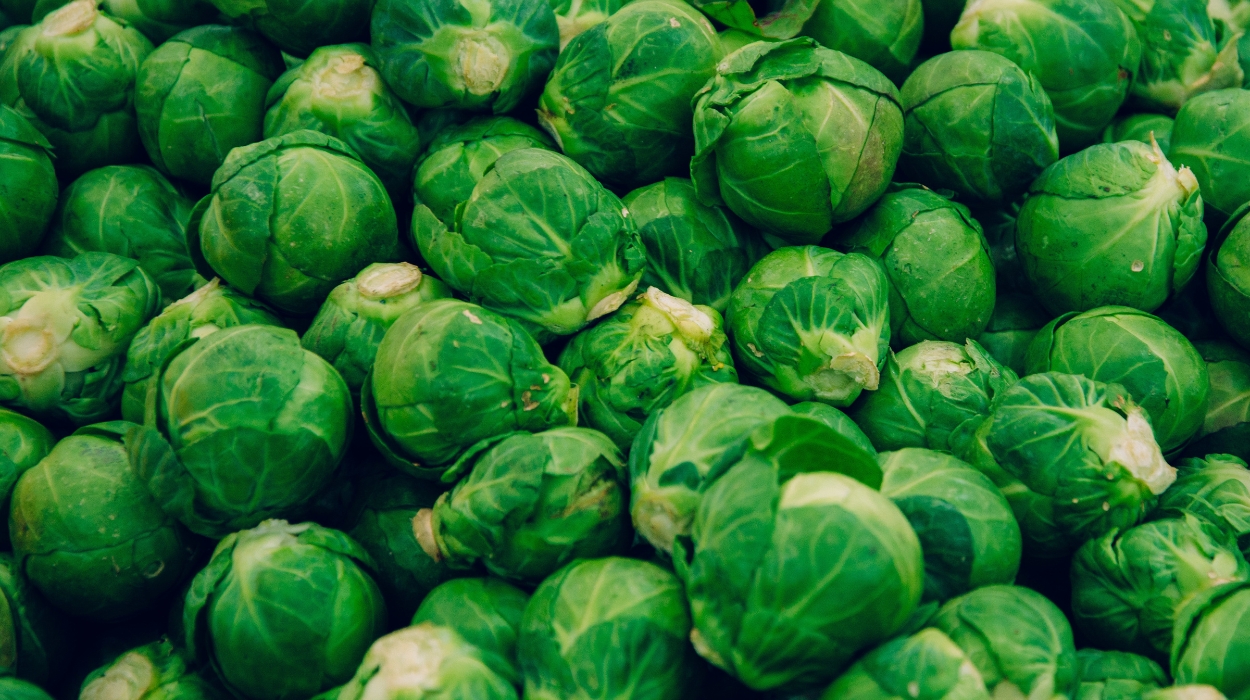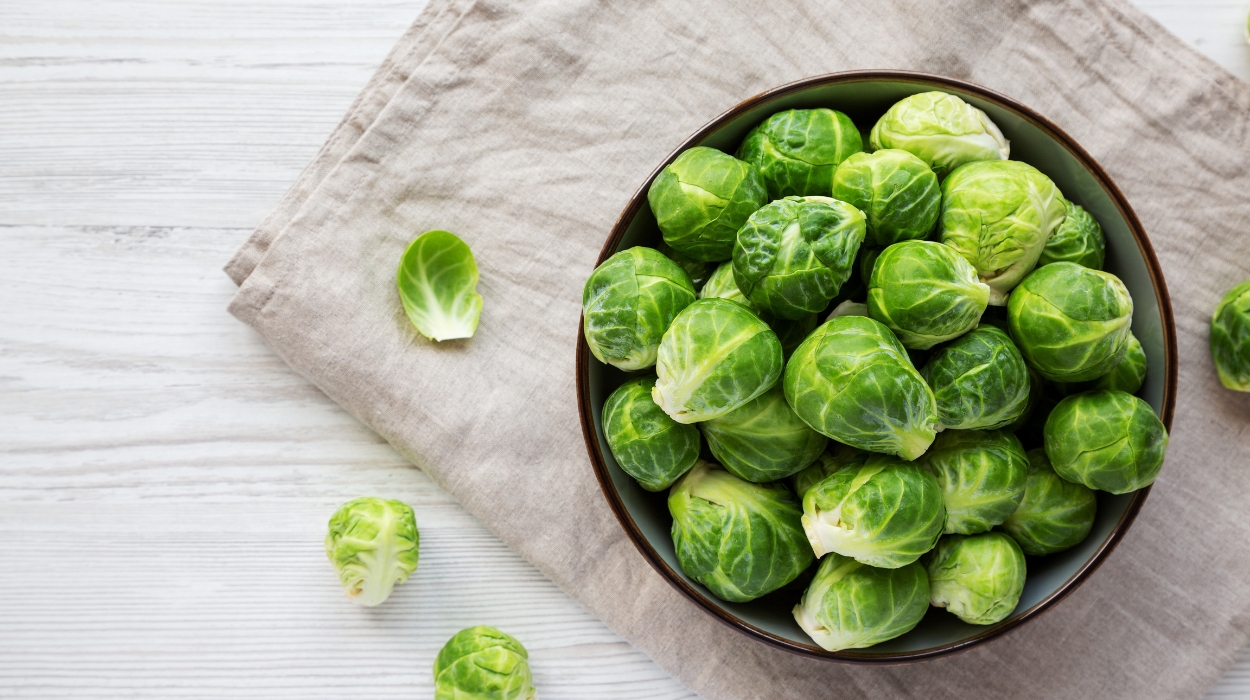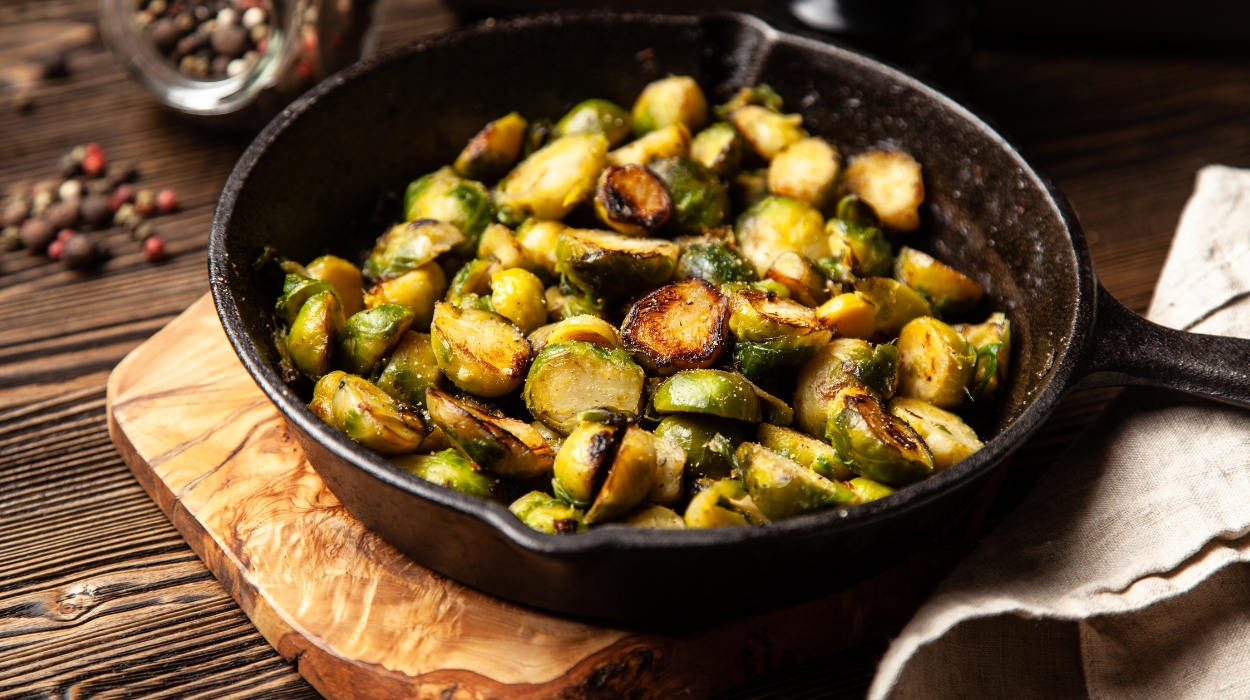 Expert's opinion
Expert's opinion
Expert's opinion
The article is a subjective view on this topic written by writers specializing in medical writing.
It may reflect on a personal journey surrounding struggles with an illness or medical condition, involve product comparisons, diet considerations, or other health-related opinions.
Although the view is entirely that of the writer, it is based on academic experiences and scientific research they have conducted; it is fact-checked by a team of degreed medical experts, and validated by sources attached to the article.
The numbers in parenthesis (1,2,3) will take you to clickable links to related scientific papers.
7 Benefits Of Brussels Sprouts, Nutrition Facts & Ways To Eat 2024

The benefits of brussel sprouts provide multiple reasons why they should earn a prominent place at your dinner table. If you’re on a path to good health, this may be the perfect sidekick plant to accompany your journey.
Brussels sprouts offer a sweet and nutty flavor, but it’s left a bad taste in the culinary world for their bitter flavor when it’s overcooked. When prepared right, this can be a delicious low-calorie dish you can look forward to eating.
Brussels sprouts are high in dietary fiber, and as a cruciferous vegetable, it is associated with a decreased risk of chronic diseases like cancer and heart disease.
One of the plants’ phytochemicals[1] is almost exclusive to this vegetable family and exhibits antioxidant and anti-inflammatory protection. Phytochemicals are beneficial to plant compounds that may provide health benefits.
Let’s explore some more of this plant’s superfood qualities and potential health benefits.
Seven Brussel Sprouts Benefits
- Improve bone health
- Improve brain health
- Prevent cancer
- Support eye health
- Support gut health
- Boost heart health
- Support immune system
Health Benefits Of Brussels Sprouts
Brussels sprouts originated from Brussels, Belgium, and are a part of the cruciferous vegetable family, like broccoli, kale, and collard greens. As it grows, this plant forms mini cabbages up and down its large stem and it is really quite a sight.
Increased intake of cruciferous veggies like Brussels sprouts results in increased levels of nutrients like fiber, vitamin K, and vitamin C. Here are some ways adding Brussels sprouts to your diet may improve your health and offer protection against certain health conditions.
Improve Bone Health
Brussels sprouts are rich in calcium and vitamin K, two essential vitamins for forming[2] bone and improving bone health. One study found that those with low vitamin K levels had an increased risk of fractures and that increasing vitamin K consumption led to a reduced risk.
An overall increased intake of cruciferous veggies is linked to increased bone strength and reduces the risk of musculoskeletal conditions[1] like fractures and bone destruction.
Improve Brain Health
Cruciferous vegetables have properties that may protect against brain disease[3] by reducing inflammation in the brain and increasing brain cell lifespan.
Studies[1] on mice show that consuming a diet rich in sulforaphane, a compound in Brussels sprouts may lessen anxiety and depression-associated behaviors.
Preclinical Alzheimer’s disease studies[1] on animals have also shown improvement in memory, learning, and motor deficits.
Brussels sprouts are a good source of vitamin K, which may provide better cognition and behavior in older adults.[4]
Prevent Cancer
One of the health benefits of brussel sprouts may be a reduced[5] cancer risk. According to the National Cancer Institute, cruciferous vegetable consumption such as Brussels sprouts may help lower the risk of pancreatic cancer.
These vegetables contain vitamin C and phytonutrients that lower inflammation and protect cells from damage, which in turn may reduce the risk of cancers like colorectal cancer.
Brussels sprouts contain essential sulfur-containing compounds called glucosinolates that show potential to prevent tumor[6] and cancer cell growth.
Support Eye Health
Brussels sprouts contain important vitamins and minerals to help support your eye health. It also contains phytonutrients that reduce inflammation, which may protect against degenerative eye diseases and cataracts.
This superfood contains other nutrients such as vitamin C, beta-carotene, lutein, and zeaxanthin. These are all antioxidants[7] that help protect your eyes from oxidative stress, inflammation, and eye disease.
Support Gut Health
Increased intake of cruciferous veggies like Brussels sprouts can support digestive health in several ways.
Brussels sprouts are high in dietary fiber, which promotes regular stool frequency to efficiently eliminate toxins that can cause illness.
One published study[8] shows eating a fiber intake of at least 30 grams per day has the potential to improve insulin resistance, lower blood pressure, and help you lose weight.
Boost Heart Health
Brussels sprouts contain alpha-linolenic acid (ALA), the most common omega-3 fatty acid.[9] Fatty acids help regulate the hormones that clot blood, relax and contract blood vessels, and reduce inflammation.
A British Journal of Nutrition study found that people with a higher intake of cruciferous vegetables had reduced calcium buildup[10] in their heart’s largest blood vessel, the aorta. This means a lower risk of stroke and heart attack than those who ate fewer veggies.
The ALA, vitamin C, and vitamin K in these sprouts may help prevent heart disease due to their anti-inflammatory potential.
Support Immune System
Cruciferous vegetables like Brussels sprouts are full of vitamins and minerals to promote a healthy immune function. The antioxidants[11] in this plant help fight free radicals that cause damage to your body’s cells inside and out.
A large balance of immune system health lies within the gut. The fiber in Brussels sprouts helps to feed the healthy bacteria, which can improve your mood, reduce inflammation, and support the immune system.
The vitamin C present also promotes white blood cell production, which helps fight against infection.
Brussel Sprouts Nutrition

There are mounds of nutritional value in Brussels sprouts, and you can find more details on their nutritional facts here.[12]
One cup of raw Brussels sprouts contains:
| Name | Amount |
| Calories | 43 |
| Protein | 3.38 grams |
| Fiber | 3.8 grams |
| Calcium | 42 milligrams |
| Iron | 1.4 milligrams |
| Magnesium | 23 milligrams |
| Phosphorus | 69 milligrams |
| Potassium | 389 milligrams |
| Vitamin C | 85 milligrams |
| Folate | 61 micrograms |
| Vitamin A | 754 international unit |
| Lutein + zeaxanthin | 1590 micrograms |
| Beta Carotene | 450 micrograms |
| Vitamin K | 177 micrograms |
Risks Of Eating Brussels Sprouts
Eating large amounts of Brussels sprouts may result in intestinal gas from the high fiber content. This is because it contains raffinose, a fiber that is hard for your intestines to break down. This is a helpful reminder to chew your food very well, which can help with the digestive process.
As earlier mentioned, Brussels sprouts are high in vitamin K. This vitamin has blood clotting abilities. If you are on warfarin[13] or blood clotting medications known as blood thinners, you may need to speak with your doctor before increasing your vitamin K intake.
There is always a risk that you might not like the taste or texture of the Brussels sprouts, even after trying reputable recipes. In that case, superfood green powder supplements make it more convenient to consume cruciferous vegetables.
Speaking of, let’s look at other ways you can add Brussels to your meals.
How To Include Brussels Sprouts In Your Diet
If you’re looking to get more of this green in your diet, you’ll be happy to know you can find fresh or frozen Brussels sprouts year-round in grocery stores.
When choosing this product, you’ll want to opt for Brussels sprouts that are firm and bright green. They are past their peak nutritional point if you find black or yellow spots.
There are many recipes to try roasted, sauteed, or baked. You can eat raw, shaved brussels sprouts on a salad or a grilled kabob with other crunchy veggies. You can add Brussels sprouts to pasta dishes, frittatas, or stir-fries. A Registered Dietitian can also teach you how to include more Brussels sprouts in your diet.
When choosing how to eat Brussels sprouts, know that fresh Brussels sprouts provide a higher nutritional value than boiled or cooked Brussels sprouts. As they boil, they lose their protein and fiber content. The longer they cook, the more bitter the taste will be.
Despite the bad reputation, Brussels sprouts get a bitter taste when overcooked, they can be easily blended into a sweet and savory dish with the proper steps. Here is a simple recipe for roasting brussels sprouts.
Easy Balsamic Honey Brussels Sprouts

This recipe serves six people.
Ingredients
- 2.5 pounds of brussels sprouts
- ⅓ cup honey
- ⅓ cup balsamic vinegar
- ⅓ cup olive oil
- One tablespoon of dijon mustard
- Two cloves of minced garlic
- One teaspoon of kosher salt
- 1/2 teaspoon of black pepper
- Three tablespoons of unsalted butter
- One teaspoon of red pepper chili flakes (optional)
Instruction
- Preheat the oven to 425 degrees Fahrenheit and have a baking sheet on hand.
- Trim the ends of the brussels sprouts and cut them in half.
- Toss the trimmed brussels sprouts, olive oil, salt, and pepper in a large bowl until coated.
- Place the cut side of the brussels sprouts facing the pan.
- Roast for 20 minutes until golden and tender. Do not flip sprouts when roasting.
- To make the sauce, heat the honey over medium-high heat in a saucepan for 1-2 minutes until it bubbles.
- Remove from the heat and add balsamic vinegar, garlic, dijon mustard, and optional chili flakes.
- Return the pan to low heat and thicken for about 5 minutes.
- Serve the glaze on the side, or pour the glaze over the sprouts. Toss to coat.
The Bottom Line
With all the health benefits Brussels sprouts may provide, it’s safe and proactive to bring this food dish out more than just on the holidays. Incorporating this green into your diet can help with weight loss and fight off chronic diseases of the eyes, brain, and bones.
+ 13 sources
Health Canal avoids using tertiary references. We have strict sourcing guidelines and rely on peer-reviewed studies, academic researches from medical associations and institutions. To ensure the accuracy of articles in Health Canal, you can read more about the editorial process here
- Connolly, E.L., Sim, M., Travica, N., Marx, W., Beasy, G., Lynch, G.S., Bondonno, C.P., Lewis, J.R., Hodgson, J.M. and Blekkenhorst, L.C. (2021). Glucosinolates From Cruciferous Vegetables and Their Potential Role in Chronic Disease: Investigating the Preclinical and Clinical Evidence. Frontiers in Pharmacology, [online] 12. doi:10.3389/fphar.2021.767975.
- Hao, G., Zhang, B., Gu, M., Chen, C., Zhang, Q., Zhang, G. and Cao, X. (2017). Vitamin K intake and the risk of fractures. Medicine, [online] 96(17), p.e6725. doi:10.1097/md.0000000000006725.
- Zhang, F. (2017). Sulforaphane Protects against Brain Diseases: Roles of Cytoprotective Enzymes. Austin Journal of Cerebrovascular Disease & Stroke, [online] 4(1). doi:10.26420/austinjcerebrovascdisstroke.2017.1054.
- Chouet, J., Ferland, G., Féart, C., Rolland, Y., Presse, N., Boucher, K., Barberger-Gateau, P., Beauchet, O. and Annweiler, C. (2015). Dietary Vitamin K Intake Is Associated with Cognition and Behaviour among Geriatric Patients: The CLIP Study. Nutrients, [online] 7(8), pp.6739–6750. doi:10.3390/nu7085306.
- National Cancer Institute. (2012). Cruciferous Vegetables and Cancer Prevention. [online] Available at: https://www.cancer.gov/about-cancer/causes-prevention/risk/diet/cruciferous-vegetables-fact-sheet
- Soundararajan, P. and Kim, J. (2018). Anti-Carcinogenic Glucosinolates in Cruciferous Vegetables and Their Antagonistic Effects on Prevention of Cancers. Molecules, [online] 23(11), p.2983. doi:10.3390/molecules23112983.
- Johra, F.T., Bepari, A.K., Bristy, A.T. and Reza, H.M. (2020). A Mechanistic Review of β-Carotene, Lutein, and Zeaxanthin in Eye Health and Disease. Antioxidants, [online] 9(11), p.1046. doi:10.3390/antiox9111046.
- Ma, Y., Olendzki, B.C., Wang, J., Persuitte, G.M., Li, W., Fang, H., Merriam, P.A., Wedick, N.M., Ockene, I.S., Culver, A.L., Schneider, K.L., Gin-Fei Olendzki, Carmody, J., Ge, T., Zhang, Z. and Pagoto, S.L. (2015). Single-Component Versus Multicomponent Dietary Goals for the Metabolic Syndrome. Annals of Internal Medicine, [online] 162(4), pp.248–257. doi:https://doi.org/10.7326/m14-0611.
- Nih.gov. (2022). Office of Dietary Supplements – Omega-3 Fatty Acids. [online] Available at: https://ods.od.nih.gov/factsheets/Omega3FattyAcids-Consumer/
- Blekkenhorst, L.C., Sim, M., Radavelli-Bagatini, S., Bondonno, N.P., Bondonno, C.P., Devine, A., Schousboe, J.T., Lim, W.H., Kiel, D.P., Woodman, R.J., Hodgson, J.M., Prince, R.L. and Lewis, J.R. (2020). Cruciferous vegetable intake is inversely associated with extensive abdominal aortic calcification in elderly women: a cross-sectional study. British Journal of Nutrition, [online] 125(3), pp.337–345. doi:https://doi.org/10.1017/s0007114520002706.
- Medlineplus.gov. (2018). Healthy food trends – Brussels sprouts: MedlinePlus Medical Encyclopedia. [online] Available at: https://medlineplus.gov/ency/patientinstructions/000725.htm
- Usda.gov. (2022). FoodData Central. [online] Available at: https://fdc.nal.usda.gov/fdc-app.html#/food-details/170383/nutrients
- Nih.gov. (2021). Office of Dietary Supplements – Vitamin K. [online] Available at: https://ods.od.nih.gov/factsheets/VitaminK-Consumer/.



